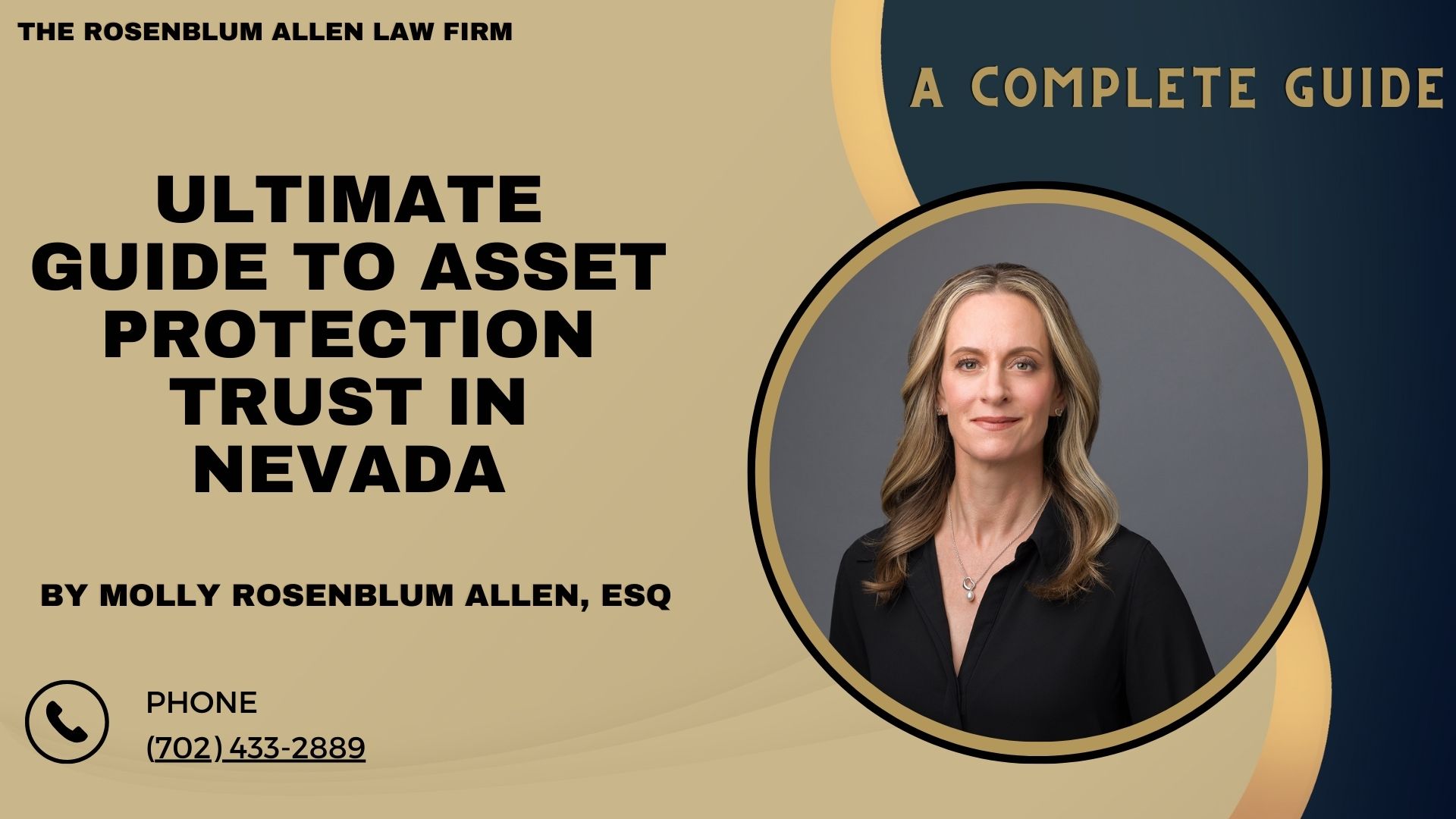Welcome to the world of financial security and peace of mind! You’re concerned about protecting your hard-earned assets from unforeseen creditors or legal battles. You’ve come to the right place. In the heart of Nevada, a state known for its good asset protection laws, lies a powerful tool. The Asset Protection Trust (APT) is designed to help you secure your wealth. This guide will walk you through all you need to know about APTs in Nevada. It covers the basics of how they work and the steps to setting one up. Let’s embark on this journey to financial tranquility together.

Understanding Asset Protection Trusts
Definition of Asset Protection Trust
An Asset Protection Trust (APT) is a legal arrangement. It lets an individual, the settlor, to put assets into a trust to shield them from creditors. APTs are different from traditional trusts. They offer strong protection against claims. This keeps the assets available for the settlor and their beneficiaries.
How Asset Protection Trusts Work
APTs operate on a simple yet effective principle. By transferring ownership of your assets to a trust, you separate them from your estate. This means that if someone sues you, these assets are not part of your wealth. So, they are out of reach from creditors.
Types of Asset Protection Trusts Available in Nevada
Domestic Asset Protection Trust (DAPT)
Nevada’s DAPT offers unparalleled asset protection among the states. It lets residents create trusts. The trusts protect their assets from creditors. But, the residents still enjoy the assets.
Self-Settled Asset Protection Trusts
This type of trust is unique to Nevada and a few other places. They let you be both the creator and the beneficiary. They offer a level of control that many other states do not have.

Benefits of Establishing an Asset Protection Trust in Nevada
Protection Against Creditors
One of the primary benefits of a Nevada APT is its ability to protect your assets from future creditors. You may face lawsuits, divorce, or other financial threats. A well-structured APT is a fortress around your wealth.
Estate Planning Advantages
Beyond protection, Nevada APTs offer significant advantages for estate planning. They can help avoid probate and lower estate taxes. They ensure that they distribute your assets as you wish without interference.
Privacy and Confidentiality
Nevada values the privacy of its residents. APTs in Nevada offer extra confidentiality. They keep the details of your assets and their distribution private.
Flexibility and Control Over Assets
You transferred ownership of your assets to a trust. But, Nevada’s laws ensure you keep control. You can specify how to invest, distribute, and manage the assets. You can tailor the trust to meet your needs and objectives.

Setting Up an Asset Protection Trust in Nevada
Creating an Asset Protection Trust (APT) in Nevada is not just a financial move. It’s a strategic play in wealth management. Here’s how you can start:
Eligibility Criteria for Settlors and Beneficiaries
Before you start the trust, you must know who can make an APT (the settlor). And, who benefits from it (the beneficiaries). In Nevada, almost anyone can start an APT. But, there are guidelines and strategies to pick the right beneficiaries. This ensures that you meet your goals.
Choosing the Right Type of Trust for Your Needs
Choosing the perfect trust type is like picking the right gear for a trek. It depends on your goals and your financial situation. Nevada’s Domestic Asset Protection Trust (DAPT) offers strong protection. But, choose between a DAPT and a Self-Settled Asset Protection Trust based on your needs.
Steps to Establish an Asset Protection Trust
Selecting a Trustee: The trustee is the captain of your APT ship, steering it through legal and financial waters. Opt for someone trustworthy and, ideally, experienced with Nevada’s trust laws.
Drafting the Trust Agreement: This document is the blueprint of your APT. It details the trust’s terms, from asset management to beneficiary rights. Think of it as the rulebook for your financial fortress.
Funding the Trust: Transferring assets into your trust is like moving your treasures into a vault. This step officially places your assets under the trust’s protection.
Maintenance and Administration of the Trust: Setting up an APT isn’t a one-and-done deal. Regular reviews and updates ensure it adapts to legal changes and your evolving financial landscape.
Challenges and Considerations
Potential Legal Challenges to Asset Protection Trusts
Even the best-laid plans can face challenges. In Nevada, APTs are generally robust, but they’re not impervious. Be aware of legal hurdles. These include claims of fraudulent transfer. Moving assets into the trust with the intent to defraud creditors is especially true.
Tax Considerations and Obligations
Federal Tax Implications: Uncle Sam still wants his share. While APTs offer excellent asset protection, they don’t exempt you from federal taxes. Planning with a tax professional can help mitigate surprises.
State Tax Considerations in Nevada: One of the perks of Nevada is its tax-friendly environment, but understanding the nuances of how your APT interacts with state tax laws is critical.
Comparing Nevada with Other Jurisdictions
Nevada often ranks top for asset protection. But, how does it compare to other states or international options? Here’s a quick comparison:
Advantages of Nevada Over Other States: Nevada’s laws are some of the most favorable for APTs in the U.S., offering robust protection, privacy, and flexibility.
International Asset Protection Trusts vs. Nevada’s DAPTs: While offshore trusts in places like the Cayman Islands or Belize can offer advantages, Nevada’s DAPTs provide a competitive, more accessible option for many.
Case Studies and Examples
Seeing is believing. Real-world examples can show the benefits and strategies of APTs in Nevada.
Successful Asset Protection Strategies Using Nevada Trusts: From entrepreneurs safeguarding their business assets to individuals protecting inheritances, Nevada’s APTs have a track record of success.
Lessons Learned from Legal Challenges: Every challenge offers a lesson. By examining cases where APTs faced legal scrutiny, we can glean insights into best practices and pitfalls to avoid.

Breaking It All Down
The journey through the world of Asset Protection Trusts in Nevada is like a quest for financial security. You can protect your assets well. Do this by understanding the details, taking smart steps, and navigating challenges. Remember, the path may seem complex. But, the peace and security of a well-established APT are invaluable. As you consider setting up an Asset Protection Trust, think of it as protecting your wealth now. It also secures your legacy for tomorrow.

Frequently Asked Questions
Can I establish an Asset Protection Trust (APT) in Nevada if I want to be both the creator and beneficiary?
Yes, you can set up a Self-Settled Asset Protection Trust in Nevada. This unique trust structure allows you to enjoy your assets while safeguarding them from potential threats.
How long does it typically take to create an Asset Protection Trust in Nevada?
The timeline varies depending on factors such as asset complexity and drafting requirements. Generally, it can range from a few weeks to several months. Engaging with an experienced attorney can streamline the process.
Are there annual fees associated with maintaining an Asset Protection Trust in Nevada?
Yes, maintaining an APT involves annual fees, including trustee fees, administrative costs, and legal fees. These fees vary based on the specifics of your trust and ensure proper management and compliance.
Do Asset Protection Trusts in Nevada offer protection against all types of creditors?
While APTs in Nevada provide robust protection, certain creditors, such as those for alimony, child support, or specific taxes, may still have claims. It’s essential to discuss these nuances with your legal advisor.
Can I change the trustee of my Asset Protection Trust in Nevada?
Yes, the terms of your trust agreement can specify conditions for changing trustees. This flexibility ensures that your trust remains managed by someone aligned with your financial goals and whom you trust.
Do I forfeit control over my assets by placing them in an Asset Protection Trust in Nevada?
Although you transfer ownership to the trust for creditor protection, you retain control based on the trust agreement’s terms. This unique feature allows you to enjoy your assets while shielding them from potential threats.
How does an Asset Protection Trust in Nevada affect my estate planning?
An APT can play a crucial role in estate planning by safeguarding assets for distribution to beneficiaries upon your death, potentially bypassing the probate process and ensuring your wishes are carried out.
Can I transfer real estate into an Asset Protection Trust in Nevada?
Yes, transferring real estate into an APT is a common strategy for protecting valuable property from potential creditors while still allowing you to benefit from and enjoy the property as outlined in the trust agreement.
What happens to my Asset Protection Trust in Nevada if I relocate from the state?
Your trust remains governed by Nevada law even if you move, but it’s essential to consider the impact on your estate and tax plans. Consulting with an attorney knowledgeable about Nevada trust law and your new state’s regulations is advisable.
Are Asset Protection Trusts in Nevada subject to federal income tax?
Yes, APTs are subject to federal income tax regulations, and the trust’s structure and income determine its tax implications. Working with a tax advisor familiar with trust taxation can ensure compliance and optimize tax benefits.

Glossary
Asset Protection Trust (APT): A legal structure designed to protect assets from creditors, legal judgments, and other claims, ensuring that the settlor’s wealth is safeguarded under specific legal frameworks.
The settlor: The individual who establishes the trust, transferring ownership of their assets into the trust for protection and management according to the trust agreement.
Beneficiary: A person or entity designated to benefit from the trust’s assets. Beneficiaries can receive income, principal, or other benefits as stipulated in the trust agreement.
Trustee: The individual or institution responsible for managing the trust and its assets according to the terms of the trust agreement and for the benefit of the beneficiaries.
Domestic Asset Protection Trust (DAPT): A type of trust established within the United States, specifically in states with legislation supporting this form of asset protection, allowing for the shielding of assets from creditors.
Self-Settled Asset Protection Trust: A trust where the settlor also serves as a beneficiary, allowing them to protect assets from creditors while still benefiting from those assets, permitted under specific state laws.
Fraudulent Transfer: A legal term referring to transferring assets intending to hinder, delay, or defraud creditors. Such transfers are subject to legal scrutiny and potential reversal.
Statute of Limitations: A law prescribing the maximum period within which legal action can be taken. In the context of asset protection trusts, it often refers to the time frame within which creditors can challenge the transfer of assets into the trust.
Exception Creditors: Creditors who, under certain circumstances, can penetrate the protections offered by an asset protection trust to claim assets, such as claims for alimony, child support, or specific types of taxes.
Compliance: The act of adhering to laws, regulations, and standards. Asset protection trusts involve state laws, tax codes, and other legal requirements to ensure the trust’s effectiveness and legality.
Due Diligence: A comprehensive investigation and evaluation are conducted to assess the trust’s setup, operation, and administration, ensuring compliance with legal and regulatory standards.
Probate: The legal process through which a deceased person’s estate is properly distributed to heirs and designated beneficiaries, often involving court supervision.
Federal Tax Implications: The tax consequences at the national level affect trusts, including income taxation and potential estate taxes, depending on how the trust is structured and operates.
State Tax Considerations: The specific tax laws and implications at the state level can affect how trusts are taxed and administered, varying significantly from state to state.

Additional Resources for You
In addition to the comprehensive guide on Asset Protection Trust in Nevada, our lead attorney, Molly Rosenblum Allen, Esq., has meticulously created a suite of resources to assist you in navigating through your estate planning needs. These resources are designed to provide clarity and direction during what can often be a complex process. Here’s a brief overview of each:
Las Vegas Estate Planning Attorney: A dedicated page that outlines the estate planning services offered by our firm, tailored to residents of Las Vegas seeking effective legal guidance.
Las Vegas Trust Attorney: This resource offers detailed information on trust creation and administration, highlighting how our legal expertise can help secure your assets and ensure they are managed according to your wishes.
Tips On Estate Planning: A valuable article providing practical advice on estate planning, designed to help you avoid common pitfalls and make informed decisions.
Estate Planning Checklist: An essential checklist that walks you through the critical steps in the estate planning process, ensuring nothing is overlooked.
Making a Will: A comprehensive guide on how to create a will, covering everything from deciding on beneficiaries to understanding the legal requirements in Nevada.
Estate Planning Services: An overview of our estate planning services, offering insight into how we can assist you in achieving your estate planning goals.
Estate Planning Mistakes: An informative piece that highlights common estate planning mistakes and how to avoid them, ensuring your estate is planned correctly and efficiently.
Estate Planning Probate: A resource that explores the probate process in Nevada, offering guidance on how to navigate this process smoothly and with confidence.
We encourage you to explore these resources, each crafted to provide you with the knowledge and support needed during your estate planning journey. Whether you’re establishing a trust, making a will, or seeking to avoid common mistakes, Molly Rosenblum Allen, Esq., and our team are here to guide you every step of the way.

Outside Resources for You
American Bar Association (ABA): The ABA provides a wealth of resources related to legal topics, including estate planning and asset protection. Their site offers articles, legal guides, and information on finding legal assistance.
National Association of Estate Planners & Councils (NAEPC): NAEPC is dedicated to promoting excellence in estate planning by providing its members with education, networking opportunities, and professional development.
EstatePlanning.com: This site offers a comprehensive overview of estate planning, including articles on trusts, wills, estate taxes, and how to choose an estate planning attorney.
WealthCounsel: WealthCounsel is a professional community of estate planners and attorneys with a focus on providing estate and business planning solutions. Their site contains valuable resources and education for both professionals and consumers.
National Academy of Elder Law Attorneys (NAELA): NAELA is an organization of attorneys who specialize in elder law and special needs planning, including areas such as estate planning and trusts.
The Balance: While not exclusively legal, The Balance offers comprehensive articles on financial planning, including estate planning and managing your assets effectively.
Investopedia: Known for its clear explanations of complex financial and legal topics, Investopedia includes a section dedicated to estate planning, trusts, and protecting your financial assets.

A Special Message from Our Lead Attorney, Molly Rosenblum Allen, Esq

Dear Valued Reader,
Thank you for exploring our resources. They cover Asset Protection Trusts in Nevada and other key estate planning topics. We understand that navigating estate planning and asset protection can be daunting. But, you don’t have to do it alone.
At The Rosenblum Allen Law Firm, my team and I dedicate ourselves to giving effective and personal solutions. We tailor them to your unique situation. Are you considering setting up an Asset Protection Trust? Do you need guidance on estate planning? Or, do you have any questions about securing your financial legacy? We’re here to help.
Please call us at (702) 433-2889. We can talk about your needs and how we can help you with your estate planning goals. We can work together to safeguard your assets. We can also ensure your peace of mind for the future.
We look forward to the opportunity to assist you.
Warm regards,
Molly Rosenblum Allen, Esq.



